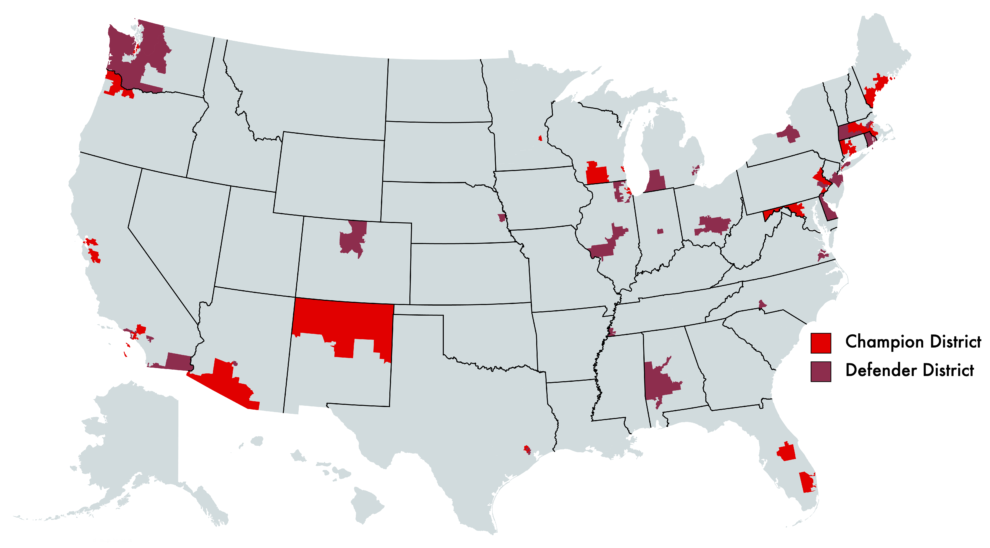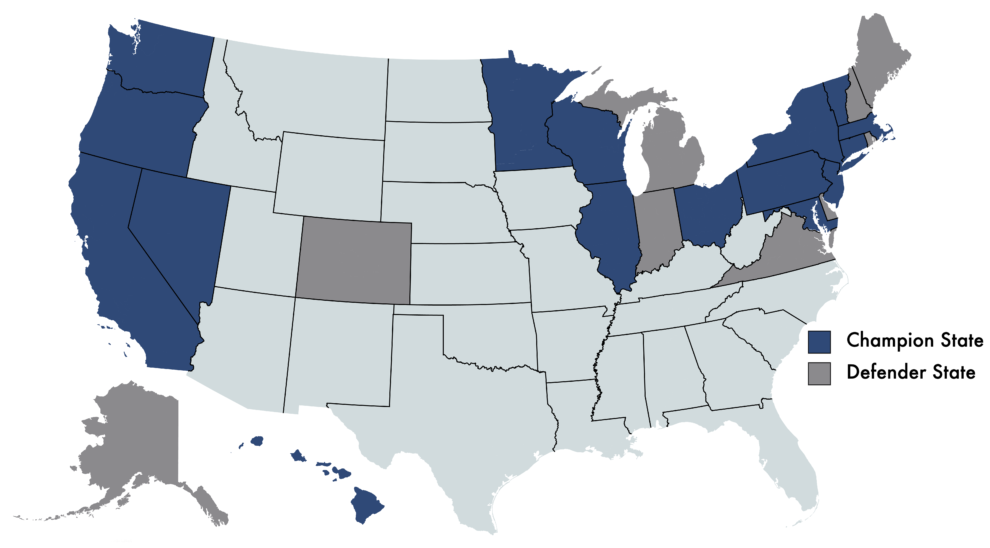Our nation’s children face multiple challenges to their well-being stemming from years of a declining share of federal investments in their future, the COVID-19 global pandemic, the ensuing economic recession, and racial injustice that begins at birth.
Every aspect of the lives of children is being negatively impacted by these factors. The kids are NOT alright, and we must do better.
Consequently, in an attempt to recognize and thank those lawmakers in the 116th Congress who actively worked to make children a greater priority in the halls of Congress, First Focus Campaign for Children is pleased to present our Legislative Scorecard for the 166th Congress.
The growing needs and problems facing children demand attention, policy solutions, political will, and action that make children a priority. Unfortunately, kids are far too often an afterthought in Congress. The problem is that children don’t vote and don’t have Political Action Committees (PACs) that garner and demand attention.
As a result, children are facing a variety of problems that are impacted by federal policy, including:
- Declining Federal Investments in Children: The share of investments in children has declined from 8.02 percent in FY 2016 to 7.48 percent in FY 2020 of the federal budget – a decline of 9 percent. President Trump’s FY 2021 budget proposal would have eliminated or consolidated into block grants 59 children’s programs and imposed real cuts of $21 billion in spending on children. Consequently, the President’s budget proposal would have caused the share of funding for children to drop to just 7.31 percent.
- Rising Uninsured Children: After two full decades of decline since the enactment of the Children’s Health Insurance Program (CHIP) in 1997, the children’s uninsured rate has grown for each of the last three years and is expected to show a continued negative trend when the government releases final numbers for 2020.
- High Child Poverty: After a few years of improvement, the child poverty rate is expected to rise significantly in 2020 and that level already was more than 50 percent higher for children than for adults. The U.S. rate for child poverty ranks 38th among the 41 wealthiest countries in the world, according to a recent UNICEF report. A 2019 landmark report from the National Academy of Sciences, Engineering, and Medicine released estimates that child poverty costs the nation more than $1 trillion annually.
- Rising Child Suicide Rates: The suicide rate nearly tripled for children aged 10-14 from 2007 to 2017 and increased 76 percent for people aged 15-19. Suicide is now the 2nd leading cause of death for children in both age groups.
- Increasing Child Abuse and Neglect: After years of decline, there has been a 10 percent rise in the number of children placed in foster care largely due to increased levels of substance use, including but not limited to opioids. Furthermore, between FY 2013 and 2017, the fatality rate for children from abuse and neglect increased by 11 percent.
- High Infant Mortality: The U.S. rate remains far higher than in comparable countries based on Gross National Product (GNP). According to the Peterson Center on Healthcare and Kaiser Family Foundation, the U.S. infant mortality rate is 71 percent higher than in comparable European nations.
- High Rates of Food Insecurity: In 2017, 12.5 million children lived in food-insecure households, according to the U.S. Department of Agriculture. The Department’s report finds “food security to be statistically associated with various outcomes involving health, nutrition, and children’s development….”
- Rising Child Homelessness: The number of identified and enrolled students reported as experiencing homelessness at some point during the school year to the U.S. Department of Education increased 10 percent, from 1.36 million students in school year 2016-2017 to over 1.5 million students in school year 2017-2018.
- Endangering the Children of Immigrants: Federal policy should ensure that the “best interest of the child”, but federal agencies are separating migrant families, placing children in detention centers for lengthy periods, failing to provide basic health and safety protections for children, and compounding the trauma facing immigrant and migrant children.
Now, more than ever, children need policymakers to be their Champions and Defenders who are willing to focus on, support, raise their voices, and attach their name to legislation that would improve the lives of our nation’s children and to actively oppose legislation or regulatory and administrative actions that would harm kids.
The Gender Gap Persists on Children’s Issues

Women in the last Congress were more than two-and-a-half times more likely than men to be Champions or Defenders of Children — with 43.3 percent of the women in Congress named either a Champion or a Defender. In fact, women made up 46 percent of our list this year, despite representing only 24 percent of Congress. There were 65 men among the Champions and Defenders, however, less than 7 percent of the men in Congress scored high enough to be named a Champion for Children.
The Regional Divide on Children
FFCC’s Legislative Scorecard identifies significant differences in support for our nation’s children by region:
- The Northeast leads all regions: The percentage of Champions or Defenders among House and Senate members from the Northeast (Maine, Vermont, New Hampshire, Massachusetts, Connecticut, Rhode Island, New York, New Jersey, Pennsylvania, Maryland, and Delaware) rose to 42 percent at the close of the 116th Congress.
Overall leaders in the Senate and House from this region include: Sens. Bob Casey (D-PA), Kirsten Gillibrand (D-NY), Richard Blumenthal (D-CT), Cory Booker (D-NJ), Ed Markey (D-MA), Elizabeth Warren (D-MA), and Chris Van Hollen (D-MD) and Reps. Ayanna Pressley (D-MA), James McGovern (D-MA), Jahana Hayes (D-CT), and Brian Fitzpatrick (R-PA).
The worst scoring scorecard member from this region was Rep. Andy Harris (R-MD).
- The West is a close second: The West region led all regions in the 2019 report but dropped to a close 2nd with 37 percent of Western (Alaska, Hawaii, California, Oregon, Washington, Idaho, and Nevada) House and Senate members qualifying as Champions or Defenders.
Overall leaders in the Senate and House from this region include: Sens. Kamala Harris (D-CA and now Vice President-elect) and Jeff Merkley (D-OR) and Reps. Barbara Lee (D-CA), Ro Khanna (D-CA), Lucille Roybal-Allard (D-CA), and Karen Bass (D-CA).
The lowest scoring member from this region was Rep. Tom McClintock (R-CA).
- The Midwest is well-represented: 24 percent of House and Senate members qualified as Champions or Defenders in the Midwest (Ohio, Michigan, Indiana, Illinois, Wisconsin, Minnesota, Iowa, and Missouri).
Top 10 leaders in the Senate and House from this region include: Sen. Sherrod Brown (D-OH) and Reps. Gwen Moore (D-WI) and Jan Schakowsky (D-IL).
The lowest scoring members from the region were Reps. Justin Amash (I-MI), Jim Banks (R-IN), and Jim Jordan (R-OH).
- The Southwest and Plains states lag behind: Among Southwestern (Arizona, Utah, Colorado, New Mexico, Texas) and Plains (Oklahoma, Kansas, Nebraska, Wyoming, Montana, North Dakota, and South Dakota) states, just 9 percent of House and Senate members qualify as Champions or Defenders.
The top-ranked members from this region were Sen. Michael Bennett (D-C) and Reps. Raul Grijalva (D-AZ) and Deb Haaland (D-NM), who was recently nominated to be Secretary of the Interior by President-elect Joe Biden.
The worst scoring members from this region were Reps. Chip Roy (R-TX), Ken Buck (R-CO), and Andy Biggs (R-AZ).
- The Southeast continues to largely fail kids: In the Southeast (Virginia, West Virginia, North Carolina, South Carolina, Georgia, Florida, Tennessee, Kentucky, Alabama, Mississippi, Louisiana, and Arkansas), a paltry 5 percent of House and Senate members were Champions or Defenders.
The top-ranked members from this region include Sen. Tim Kaine (D-VA) and Reps. Alcee Hastings (D-FL) and Darren Soto (D-FL).
The lowest scoring members were Ralph Norman (R-SC), Ted Yoho (R-FL), and Thomas Massie (R-KY).


